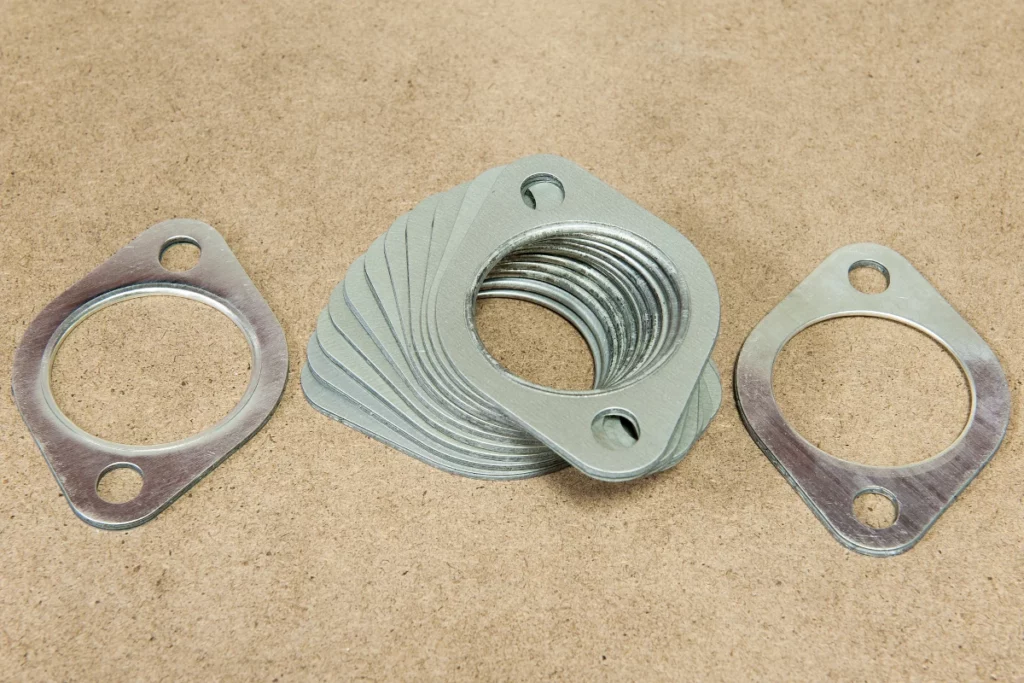The exhaust manifold does need gaskets but only sometimes requires gasket sealant to function correctly.
What exactly is the exhaust manifold gasket? Why would you choose to add sealant to the gasket? We have all these answers and more in today’s article!
Let’s Find Out If The Exhaust Manifold Needs Gaskets And Gasket Sealants
Gaskets are necessary for exhaust manifolds. They hold the pipes between the exhaust system and the cylinder heads in place and prevent gas leaks. Gasket sealants aren’t required for most situations, but some use them for extra sealing strength.
- Let's Find Out If The Exhaust Manifold Needs Gaskets And Gasket Sealants
- Can You Use An Exhaust Manifold Without A Gasket And Gasket Sealant?
- What Happens If The Exhaust Manifold Doesn't Have a Gasket And Gasket Sealant?
- How Long Will The Exhaust Manifold Gasket Last?
- Does Gasket Sealant Help Extend the Lifespan of the Car's Gasket?
- How Much Does Replacing An Exhaust Manifold Gasket And Gasket Sealant Cost?
- Closing Thoughts
- Sources

Gaskets on the exhaust manifold are necessary. Without a gasket, there is the possibility of gas leaks and fumes entering the car cabin.
Gas exposure can cause the driver to pass out or experience harmful effects on their health. It can also cause pollution in the surrounding environment.
The catalytic converter is connected to the exhaust manifold with gaskets. Without a proper seal, the gas might be released before the catalytic converter converts the C01 to C02 and water.
For this conversion to occur, the exhaust system must transfer the gas from each part of the system. Gaskets are a vital part of this system and prevent leaks. However, gasket sealant is only sometimes needed.
Sealant is sometimes used in older cars. Some amateur and professional mechanics find the extra sealant adds more adhesion to the gasket. Others argue that extra sealant can disrupt a gasket from sealing properly or is excessive.
Adding extra sealant doesn’t improve adhesion unless your gaskets don’t have sealant. Since the gasket already has sealant, adding extra could prevent the gasket from sealing completely.
Most mechanics don’t recommend sealant if your exhaust manifold is fairly new. Whenever you have your exhaust system tuned up, the gaskets are checked. This means if they’re no longer holding a seal properly, the mechanic will likely change them.
Gaskets are necessary for the exhaust manifold and catalytic converter. However, adding sealant is largely considered excessive and unnecessary.
Related:
- Are Car Exhaust Manifold Gaskets Reusable? (Explained For Beginners)
- Is A Car Exhaust Manifold Heat Shield Necessary? (3 Signs Of Damage)
- 5 Reasons Why My Car Exhaust Manifold Is Smoking? (Solved)
Can You Use An Exhaust Manifold Without A Gasket And Gasket Sealant?
You don’t need to use gasket sealant in your exhaust manifold. However, you do need to use gaskets in your exhaust manifolds. You need to use these to prevent gas and fumes from escaping the pipes before it’s been processed by the catalytic converter.
Using your exhaust manifold occurs every time you turn on and drive your vehicle. It collects the fumes from the engine and pushes them through the catalytic converter. Once the fumes have been safely modified, they are expelled from the exhaust pipe.
Without a gasket, this process cannot take place. This is best exemplified when the car “blows a gasket.” What does it mean when the car blows a gasket?
Essentially, when the gasket blows, it cracks or otherwise malfunctions. When the car blows a gasket, it can cause the engine to struggle because of blocked airflow. The gasket rests between the exhaust manifold and the engine.
Most engines have only one gasket; however, V6 and V8 engines need two. A broken gasket disrupts the coolant system, the engine, and the exhaust system. Thus it’s necessary for your exhaust manifold to have a working gasket.
However, a sealant is, by and large unnecessary. Not only is it unnecessary, but it can cause the seal to break as it heats up. Unless your mechanic recommends it, we don’t suggest using sealant on your own.
What Happens If The Exhaust Manifold Doesn’t Have a Gasket And Gasket Sealant?
Your vehicle will likely struggle without a gasket or with a broken gasket. The seal allows the air to flow uninterrupted and encourages the engine and coolant system to function properly. A sealant will not have any positive impact on your vehicle’s performance unless it’s recommended by a professional.
Some of the signs that your exhaust manifold has a blown gasket or is missing a gasket include the following signs:
- Lagging power in the engine
- Smoke
- A burning smell coming from the vents
- Overheating engine
The exhaust manifold gasket is a very small component of the exhaust system. However, it performs a vital job, preventing dangerous fumes from escaping the engine.
If you notice any of these signs, you should avoid driving your vehicle. Deadly fumes may be entering your car’s cabin, which can negatively impact your health.
Carbon monoxide poisoning is a dangerous side effect of exposure to fumes. This can occur even after the catalytic converter modifies it before expelling. But these fumes are even more dangerous if they are expelled before they’ve been treated.
If you notice any of the above signs in your vehicle, you should take it to get looked at before driving again. Or, you can check it yourself if you know what you’re looking for in the exhaust system.
However, changing your car’s gasket is difficult since it’s hidden inside your system. Just be careful and know what you’re doing before taking apart your exhaust system.
How Long Will The Exhaust Manifold Gasket Last?
Most gaskets should last for several years before they need to be replaced. However, their lifespan can vary depending on your environment and how far you drive on average. Most gaskets should last up to 100,000 miles before they need to be replaced.
Most exhaust manifold gaskets were designed to withstand a lot of external damage. They’re made of steel which helps them withstand shock and jolting from the roadways.
They don’t break easily and are more likely to wear out rather than break. It’s best to be safe and either check yourself or have your mechanic check your gasket when you get your car checked.
Your gasket can break or get damaged in several ways, including:
- Cracks from extreme weather
- Carbon buildup
- Poor maintenance
Carbon is a natural by-product of combustion. As your vehicle burns fuel, it creates carbon particles. These particles build up over time and can disrupt the airflow in your vehicle. Having your vehicle cleaned regularly is important to prevent this carbon from breaking the gaskets.
This carbon can also cause your gaskets to catch fire and expand. This can break the seal and leak noxious fumes. Always get your car maintenance done on time to prevent damage to your vehicle.
Does Gasket Sealant Help Extend the Lifespan of the Car’s Gasket?
Proper sealant can help extend the life of your gasket in certain instances. The most important factor when selecting your sealant is whether it’s reputable. A good sealant can prevent moisture, oil, and debris from disrupting the gasket’s seal and increasing its lifespan.
This might seem a little confusing to those who read the first part of this article. While most mechanics do not recommend adding sealant, it’s important to understand the reasons.
These reasons mostly consist of the following:
- They are poorly made
- Disrupt the gasket seal
- Break easily
Most poorly made sealants break the seal of the gasket. Thus they work against the thing they’re supposed to improve. Additionally, this sealant is largely unnecessary for new cars because the gaskets come with a sealant.
If your mechanic recommends sealant, it will probably help improve the lifespan of your car’s gaskets.
How Much Does Replacing An Exhaust Manifold Gasket And Gasket Sealant Cost?
Exhaust manifold gaskets aren’t very expensive, but labor costs can add up quickly. The gasket only costs between $30-$40. Gasket sealant costs about $20-$30.00 per container if you choose to use it.
Replacing an exhaust manifold gasket can become expensive. This isn’t really because of the cost of the parts, which, as we showed above, are not expensive.
However, the exhaust manifold gaskets are difficult to get to and take time to change properly. Not only do you have to take part in the whole system, but you usually have to clean the system as well.
This can take a couple of hours to do properly, thus costing between $200-$350.00 for labor. This can make the total cost, with parts, up to $450.00.
Closing Thoughts
The exhaust system is an important part of safe travel. It prevents dangerous fumes from polluting the environment and causing carbon monoxide poisoning.
The gasket is an important part of this system. The best way to prevent harm to your body and car is to regularly clean your exhaust system.
Carbon can build up quickly, so you should have it cleaned every year. This can vary depending on where you live and how much you drive.
We hope this article helped you understand this tiny car part with a new sense of appreciation!
Sources
Master Mechanic: Exhaust Gaskets
Synchrony: What is a Catalytic Converter, and How Does it Work?
Vintage Mustang: Exhaust manifold (Thread)
Subaru: 5 Signs Your Head Gasket Is Blown: Capitol Subaru Auto Care Articles
Mega Gaskets: Exhaust Manifold Gasket
Symptoms of a Bad or Failing Exhaust Manifold Gasket
CarTaq: Carbon Monoxide poisoning death: Here is how it can happen in a car
Ford: How Do I Replace a Leaking Exhaust Manifold Gasket?
Advanced Auto Parts: How to Fix an Exhaust Manifold Gasket Leak



